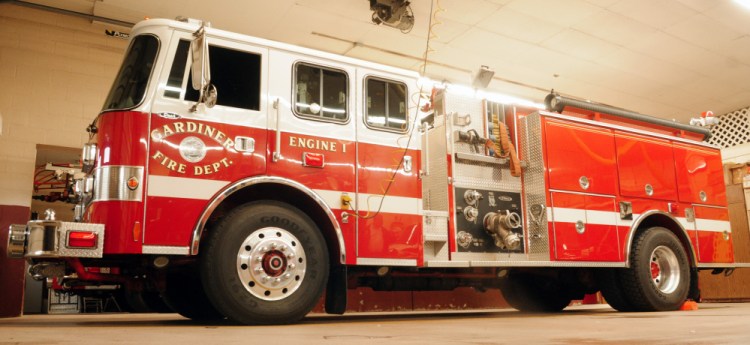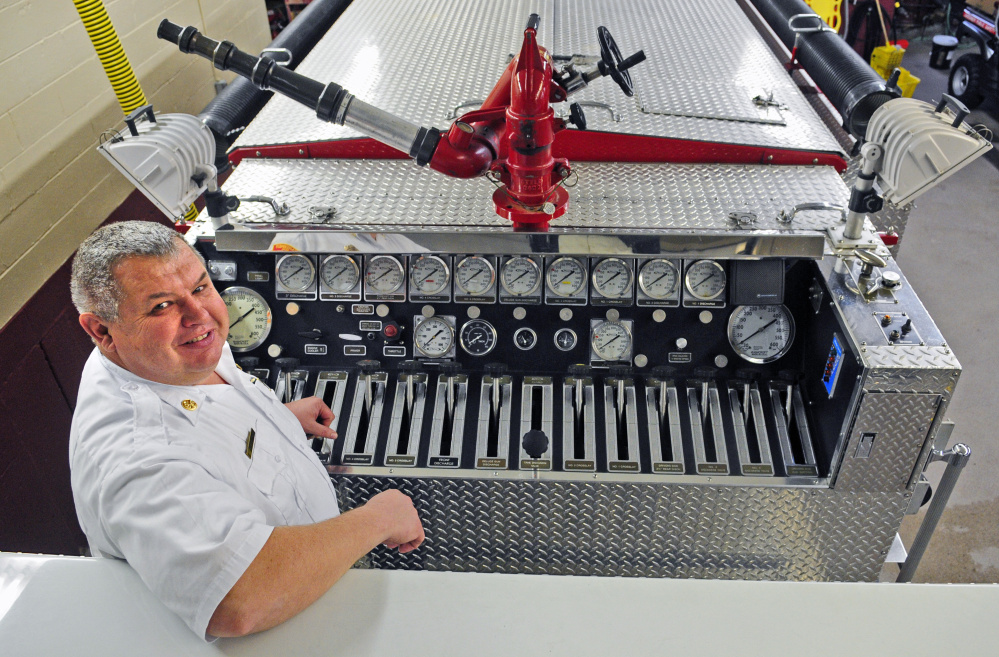GARDINER — Gardiner Fire Chief Al Nelson submitted a grant request a year ago to the Federal Emergency Management Agency to help pay for a new firetruck.
All other things being equal, the city should have been at the top of the list. Gardiner has two engines — one that’s 28 years old and the other that’s about 24 years old. While both have been maintained, both are beyond what’s considered to be their useful lives, and tests on the pump on Engine 1, the older engine, show it is failing.
With sticker prices on fire engines approaching $600,000, grants are critical.
Gardiner’s first Assistance to Firefighters grant application was rejected earlier this year because the match offered by the city, about $53,000, wasn’t enough. Nelson is giving it another shot, this time with a match of $200,000 with the support of the City Council, which has authorized the department to proceed with the grant proposal.
“The Assistance to Firefighters representative said we should have been at the top of the list last year,” Nelson said this week at a City Council meeting.
Grants are scored in two phases. The first phase is scored by computer. To move on to the second phase, during which a committee considers the narrative section, grants must score 96 to 98. That score is based on a department’s call volume, a municipality’s population and the matching amount.
In looking at the awards distributed, he said, most were around $350,000, which indicated a grant match of about $200,000.
With this piece of fire equipment, Gardiner officials are taking a different tack. Five years ago, the city acquired a ladder truck, paid for through bonds — a mechanism that municipalities use to borrow money to pay for high-ticket items. The repayment period runs through 2035. This year’s payment is $70,385, and each successive payment will be a few thousand dollars less, City Manager Scott Morelli said. By the time it’s paid off, he said, it will be about time to buy a new one.
The match for this engine would come out of the city budget and would be paid off in four years.
“This is a good deal compared to what we’re paying in debt service on the ladder,” Morelli said.
Nelson said the match money won’t be needed until the city is ready to buy an engine. The grant deadline is in January, and awards will be announced from March to September. If Gardiner secures the grant, Nelson then will seek bids for the vehicle.
While it may look like either of the current engines, Nelson said the differences in the new vehicle will come in the technology and safety features.
“Since 1987, there have been great improvements to safety. This new engine will have air bags, roll cages and shoulder straps (on seat belts),” he said, and those weren’t required in the late 1980s.
The new engine also will have new capabilities not available on the current engine, such as winches on all four sides to help with extrications, and a rooftop lighting system.
The state-of-the-art technology on the new engine will be a boon to the department, but it comes with a downside, Nelson said. While most fire vehicles serve 20 years as a front-line vehicle and five years as a backup, the newer vehicles are expected to serve 15 years as a front-line vehicle.
“I understand it’s a lot of money,” Nelson said. “And I need to be cognizant of the tax base. But if you don’t replace equipment when you need to, you are not doing taxpayers any favors.”
That’s because of the effect of inflation. When he priced engines a year ago, Nelson said the estimate was $550,000. This year, he said, the range was $575,000 to $600,000.
The truck that would replace Engine 1 would be a rescue pumper. Nelson plans to replace Engine 2, when the time comes, with a rescue tanker.
The question that lingers in Gardiner, and that surfaced during the city’s level of service reviews earlier this year, is whether the building damaged most severely in the downtown fire in July could have been saved. What was left of 235 Water St. was demolished in November.
The short answer, Nelson said, is no.
“A new truck would not have changed the outcome of that fire. The outcome was determined before we got there,” he said. The fire had gotten into the space above the ceiling and started to run.
“We taxed those trucks for hours, and they did their job. If we did the same thing tomorrow, would they fail?”
Jessica Lowell — 621-5632
Twitter: @JLowellKJ
Send questions/comments to the editors.




Success. Please wait for the page to reload. If the page does not reload within 5 seconds, please refresh the page.
Enter your email and password to access comments.
Hi, to comment on stories you must . This profile is in addition to your subscription and website login.
Already have a commenting profile? .
Invalid username/password.
Please check your email to confirm and complete your registration.
Only subscribers are eligible to post comments. Please subscribe or login first for digital access. Here’s why.
Use the form below to reset your password. When you've submitted your account email, we will send an email with a reset code.